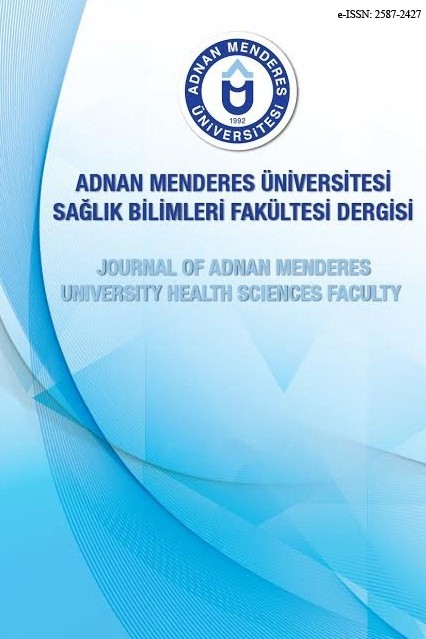Birinci Basamakta Çalışan Ebe ve Hemşirelerin Obezite Önyargısı
Sağlık profosyoneli, Obezite, Önyargı
Prejudice Obesity of Midwives and Nurses in the Primary Health Care
Health Professional, Obesity, Obesity Bias,
___
- 1. Bagriacik, N. (2009). National obesity prevention and treatment guide, İstanbul: Obesity Research Association Publications.
- 2. World Health Organization. Obesity and overweight fact sheet. http://www.who.int/mediacentre/factsheets/fs311/en/. (Access Date: January 1, 2018).
- 3. Bagriacik, N., Onat, H., Ilhan, B., Tarakcı, T., Ozar, Z., Ozyazar, M. et al. (2009). Obesity profile in Turkey. Int J Diabetes & Metabolism, 17, 5–8.
- 4. TURDEP Çalışma grubu TURDEP-II Sonuçlarının Özeti 2010 http://istanbultip.istanbul.edu.tr/wpcontent/uploads/attachments/021_turdep.2.sonuclarinin.aklamasi.pdf. (Access Date: January 1, 2018).
- 5. Fontaine, K. R., & Barofsky, I. (2001). Obesity and health-related quality of life. Obes Rev, 2, 173-182.
- 6. Paker, M. (2017). Psychological bias and discrimination. Cayır, K. & Ceyhan M.A. (eds). Discrimination: multidimensional approaches. 1th ed. (ss. 41-43). Istanbul; Istanbul Bilgi University Press.
- 7. Fıeld, A. E., Bamoya, J., & Coldıtz, A. (2003). Effects of obesity on epidemiology, health and economy. Wadden, T. A., & Stunkard, J. A. (eds). Obesity treatment manual, 1th ed. İstanbul.
- 8. Gudzune, K. A., Beach, M. C., Roter, D. L., & Cooper, L. A. (2013). Physicians build less rapport with obese patients. Obesity (Silver Spring), 21(10), 2146–2152.
- 9. Gudzune, K. A., Bennett, W. L., Cooper, L. A., & Bleich, S. N. (2014). Patients who feel judged about their weight have lower trust in their primary care providers. Patient Educ Couns, 97(1), 128-131.
- 10. Sert, H., Seven, A., Çetinkaya, S., Pelin, M., & Aygin, D. (2006). Evaluation of prejudice against obesity in health high school students. Online Türk Sağlık Bilimleri Dergisi, 4, 9-17.
- 11. Altınayak, S. Ö., Gur, E. Y., Apay, S.E., & Ozkan, H. (2017). Midwifery students' prejudice against obese pregnant women. Journal of Anatolia Nursing and Health Sciences, 20(3), 201–207.
- 12. Yildiz, M., & Yalcinoz Baysal, H. (2019). Prejudice against obesity in university students studying in health-related departments. Perspect Psychiatr Care, 55 (2): 170-174.
- 13. Soto, L., Armendariz-Anguiano A. L., Bacardi-Gascon, M., & Cruz, A. J. (2014). Beliefs, attitudes and phobias among Mexican medical and psychology students towards people with obesity. Nutr Hosp, 30(1), 37–41.
- 14. Altun, S. (2015). Determination of university students’ prejudice against obesity. Baskent University, Faculty of Health Sciences. Nutrition and Dietetics, Ankara.
- 15. Usta, E., Acar, K., & Aygin, D. (2015). The attıtudes of students towards obesıty ın the vocatıonal college of health servıces. Electronic Journal of Vocational Colleges, Specıal ıssue: 46-53.
- 16. Schwartz, M. B., O'Neal, H., Brownell, K. D., Blair, S., & Billington, C. (2003). Weight bias among health professionals specializing in obesity. Obes Res, 11, 1033–1039.
- 17. Puhl, R. M., & Brownell, K. D. (2003). Ways of coping with obesity stigma: review and conceptual analysis. Eat Behav. 4, 53–78.
- 18. Khandalavala, B. N., Rojanala, A., Geske, J. A., Koran-Scholl, J. B., Guck, T. P. (2014). Obesity Bias in Primary Care Providers. Fam Med, 46(7), 532-535.
- 19. Ercan, A., Akçil Ok, M., & Kızıltan, G. (2015). Development of obesıty prejudıce scale for students of health scıences: GAMS 27- obesıty prejudıce scale. International Peer- Reviewed Journal of Nutrition Research, 3(2), 29–43.
- 20. Perez-Lopez, M. S., Lewis, R. J., & Cash, T. F. (2015). The relationship of antifat attitudes to other prejudicial and gender-related attitudes. Journal of Applied Social Psychology, 24(5), 517–525.
- 21. Usta, E., & Akyolcu, N. (2014). The evaluation of surgical nurses’ knowledge and applications on the care of overweight/ obese people. Florance Nightingale Nursing Journal, 22, 1–7.
- 22. Jay, M., Kalet, A., Ark, T., McMacken, M., Messito M. J., Richter R., et al. (2009). Physicians' attitudes about obesity and their associations with competency and specialty: a cross-sectional study. BMC Health Serv Res, 24(9), 1–11.
- 23. Danielsdottir, S., O’Brien, K. S., & Ciao, A. (2010). Anti-fat prejudice reduction: a review of published studies. Obesity Facts, 3, 47–58.
- 24. Puhl, R. M., Latner, J. D., King, K. M., & Luedicke J. (2014). Weight bias among professionals treating eating disorders: attitudes about treatment and perceived patient outcomes. International Journal of Eating Disorders, 47(1), 65–75.
- 25. Phelan, S. M., Burgess, D. J., Yeazel, M. W., Hellerstedt, W. L., Griffin, J. M., & van Ryn M. (2015). Impact of weight bias and stigma on quality of care and outcomes for patients with obesity. Obes Rev., 16(4), 319-326.
- 26. Forhan, M., & Salas, X. R. (2013). Inequities in healthcare: a review of bias and discrimination in obesity treatment. Can J Diabetes, 37(3), 205-209.
- Yayın Aralığı: Yılda 3 Sayı
- Başlangıç: 2017
- Yayıncı: Aydın Adnan Menderes Üniversitesi
Post-operatif Ortopedik Rehabilitasyonda Yeni Egzersiz İzlem ve Yönetim Teknolojileri
Birinci Basamakta Çalışan Ebe ve Hemşirelerin Obezite Önyargısı
Ayten YILMAZ YAVUZ, Hasret BAYSAL
Polikistik Over Sendromu ve Obezite: FTO ve MC4R Gen Polimorfizmlerinin Rolü
Ayçıl ÖZTURAN ŞİRİN, Yasemin AKDEVELİOĞLU
Otizm Spektrum Bozukluğu Olan Çocukların Antropometrik Ölçümlerinin Değerlendirilmesi
Meme Kanserli Bireylerde Manevi Bakımda Hemşirenin Rolü
Halime PULAT DEMİR, Başak CAN, Merve CAN TEZEL
Gebelerin Bilgi Kaynağı Olarak İnternet ve Sosyal Medya Kullanım Durumları
Gizem ÖZTÜRK, Nazlı ÜNLÜ, Esra UZUNKAYA, Zekiye KARAÇAM
Sağlık Profesyonellerinin Cinsel Mitlere İnanma Durumlarının Belirlenmesi
Yenidoğanın Doğum Odasında Aspirasyon İlkelerinde Güncel Yaklaşımlar; Ebelerin Rol ve Sorumlulukları
Artan Mobil Teknoloji Kullanımının Yol Açtığı Ağrı Sendromu: “Text Neck”
